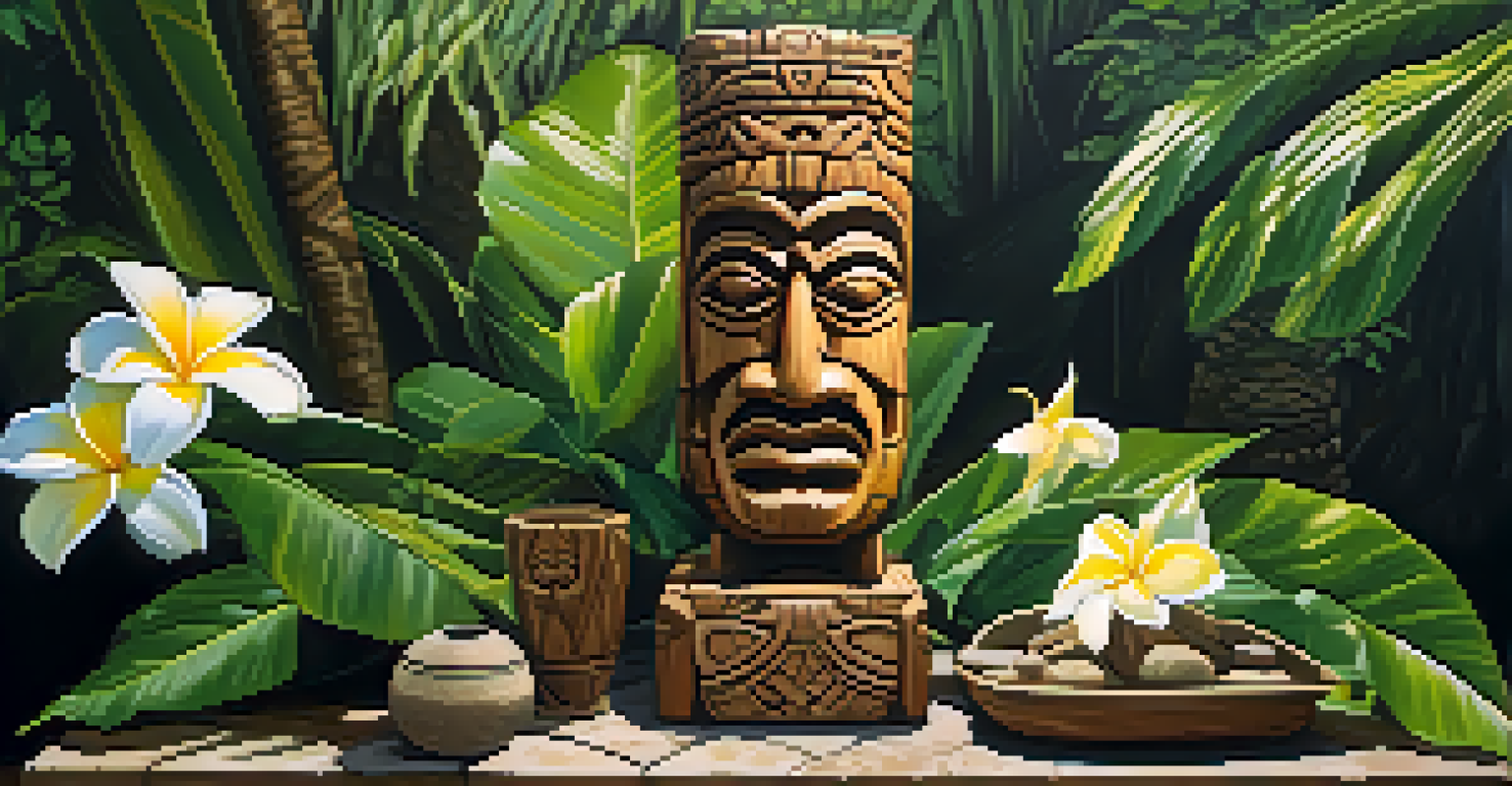The Role of Hawaiian Myths in Modern Spiritual Practices

Understanding Hawaiian Myths: A Brief Overview
Hawaiian myths are rich narratives that capture the essence of the islands' culture and spirituality. These stories often involve gods, goddesses, and legendary figures that embody natural elements and human experiences. For instance, the goddess Pele represents fire and volcanoes, symbolizing both creation and destruction. Understanding these myths provides a foundation for exploring their relevance in contemporary spiritual practices.
Myths are public dreams, dreams are private myths.
Myths serve not only as entertainment but also as teaching tools, conveying moral lessons and cultural values. They reflect the connection between the Hawaiian people and their environment, emphasizing respect for nature and community. This interconnectedness is a cornerstone of many modern spiritual practices that seek to honor ancestral wisdom.
By delving into these ancient stories, individuals can gain insight into their own spiritual journeys. The themes of resilience, transformation, and harmony found in Hawaiian myths resonate with many seeking deeper meaning in their lives today.
The Influence of Hawaiian Myths on Modern Spirituality
Modern spiritual practices often draw inspiration from ancient myths, creating a bridge between past and present. Many practitioners incorporate Hawaiian deities and their attributes into rituals and meditations, inviting the energy of figures like Lono, the god of agriculture and peace. This approach allows individuals to connect with the land and its spiritual heritage.

Additionally, Hawaiian myths encourage a holistic view of life, where spirituality is intertwined with nature and community. This perspective aligns with contemporary practices such as eco-spirituality, which emphasizes the sacredness of the Earth. By honoring these myths, practitioners can deepen their connection to the environment and foster a sense of belonging.
Hawaiian Myths Shape Modern Spirituality
Ancient Hawaiian myths inspire contemporary spiritual practices by connecting individuals to their cultural heritage and the environment.
The revival of interest in Hawaiian mythology has also sparked a broader exploration of indigenous spiritual practices. This cultural renaissance is leading many to reassess their own spiritual beliefs and how they relate to ancestral traditions, creating a rich tapestry of spiritual expression.
Rituals Inspired by Hawaiian Mythology
Rituals rooted in Hawaiian mythology often serve as a means of honoring the divine and fostering community connections. Many people engage in practices such as hula, which is not only a dance but a storytelling medium that conveys the essence of mythological narratives. Through movement and music, participants embody the stories, connecting them to their ancestors and the natural world.
The stories we tell ourselves about ourselves shape the way we understand our place in the world.
Another popular ritual is the practice of ho'oponopono, a traditional Hawaiian method of conflict resolution and forgiveness. This practice emphasizes the importance of restoring harmony within oneself and with others, echoing the themes found in many myths. By embracing these rituals, modern practitioners can cultivate a sense of peace and understanding in their daily lives.
These rituals often incorporate elements of nature, such as the use of flowers, stones, or water, reflecting the deep respect for the environment that is central to Hawaiian spirituality. This connection to nature can enhance the spiritual experience, allowing individuals to feel more grounded and attuned to their surroundings.
The Role of Symbols in Hawaiian Spiritual Practices
Symbols play a crucial role in Hawaiian spirituality, often derived from myths and legends. For example, the tiki figure represents ancestral spirits and is commonly used in rituals to invoke protection and guidance. These symbols serve as tangible connections to the divine, helping practitioners focus their intentions during spiritual practices.
Furthermore, the use of natural symbols, such as the Hawaiian sea turtle (honu) or the native bird (i'iwi), reinforces the connection between spirituality and nature. Each symbol carries its own story and meaning, enriching the spiritual experience and providing a deeper understanding of the world around us. This practice encourages a mindful approach to spirituality, where the significance of each symbol is acknowledged and respected.
Rituals Foster Community Connection
Engaging in rituals rooted in Hawaiian mythology strengthens community bonds and enhances individual spiritual experiences.
Incorporating these symbols into modern spiritual practices allows individuals to tap into the wisdom of Hawaiian mythology. By doing so, practitioners can create a personal and meaningful spiritual framework that resonates with their own beliefs and experiences.
Community and Hawaiian Spiritual Practices
Community plays a vital role in Hawaiian spirituality, with many practices emphasizing collective participation and support. Gatherings for rituals, storytelling, and celebrations create a sense of belonging and connection among participants. This communal aspect reflects the traditional Hawaiian value of 'ohana, or family, which extends beyond blood relations to include the larger community.
In modern contexts, these gatherings often focus on healing, celebration, or environmental stewardship, echoing the themes found in Hawaiian myths. Community members come together not just to honor their ancestors but also to address contemporary issues, fostering a collective spirit of resilience and hope. This approach underscores the importance of unity in spiritual growth.
By engaging with others in these practices, individuals can cultivate a sense of accountability and support. This shared journey enhances the spiritual experience, allowing participants to learn from one another and deepen their understanding of both their heritage and their spiritual paths.
The Importance of Ancestral Wisdom in Spirituality
Ancestral wisdom is a cornerstone of Hawaiian spirituality, deeply embedded in the myths and legends passed down through generations. This wisdom offers guidance on living harmoniously with nature and understanding one’s place in the world. Many modern spiritual practitioners seek to reconnect with this ancestral knowledge as a way to enrich their own spiritual journeys.
Incorporating ancestral wisdom often involves practices such as storytelling, where elders share myths that hold valuable life lessons. This transmission of knowledge fosters a sense of continuity and belonging, reminding individuals of their roots and the collective experiences of their ancestors. By honoring this wisdom, practitioners can gain insight into their own lives and the challenges they face.
Ancestral Wisdom Guides Spiritual Journeys
The teachings of ancestral wisdom embedded in Hawaiian myths provide valuable insights for personal growth and understanding.
Furthermore, recognizing the value of ancestral wisdom allows for a more profound appreciation of one’s identity. This connection to the past can empower individuals to navigate their present and future with greater clarity and purpose, bridging the gap between generations.
Finding Personal Connection Through Hawaiian Myths
Hawaiian myths offer a rich tapestry of stories that resonate with personal experiences, making them a valuable resource for individuals seeking spiritual connection. Many people find parallels between their own life journeys and the challenges faced by mythological figures. For instance, the story of Maui's determination to capture the sun mirrors our own struggles to achieve balance in life.
Engaging with these myths can inspire reflection and personal growth, prompting individuals to explore their own beliefs and values. By identifying with the characters and themes in the stories, practitioners can find guidance and motivation for their spiritual journeys. This personal connection encourages a deeper exploration of both the myths and oneself.

Ultimately, the beauty of Hawaiian mythology lies in its ability to transcend time and culture, speaking to universal human experiences. By embracing these stories, individuals can cultivate a personal and meaningful spiritual practice that honors both their heritage and their unique life paths.